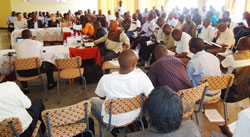KARONGI- The National Institute of Statistics of Rwanda (NISR) has criticised local leaders in the western region for using poor methods to compile administrative data. During a validation workshop held in Karongi district, last week, Bodwin Ruterana, the Director of Demographic and Social statistics at NISR, noted that ignoring official record books is a common tendency in data collection.


KARONGI- The National Institute of Statistics of Rwanda (NISR) has criticised local leaders in the western region for using poor methods to compile administrative data.
During a validation workshop held in Karongi district, last week, Bodwin Ruterana, the Director of Demographic and Social statistics at NISR, noted that ignoring official record books is a common tendency in data collection.
"There are clear indications on the malfunctioning of the administrative data system mainly due to lack of working collaboration between key stakeholders,” Ruterana said.
He noted that collective efforts are required to further strengthen the system and promised full commitment.
"With financial and technical support from our developmental partners, we shall play a leading role in transforming the sector,” he said.
He revealed that next week, 50 computers and other electronic accessories will be distributed in the Western Province as a way of enhancing capacity building.
The development follows a countrywide survey aimed at assessing the current situation in the agriculture, civil registration, education and health sectors.
A resultant report indicates that the collection of data both at the district and sector levels is still very poor.
According to the report, 73 percent of all data compilation staff in the province lack basic training while another 27.2 percent lack computers.
The Executive Secretary of Karongi District, Yves Ningabire, acknowledged that several setbacks hinder the data collection process.
"It’s true there is lack of operational equipment and enough skilled staff in data compilation; that is why the system is still poor,” Ningabire said.
Ends


